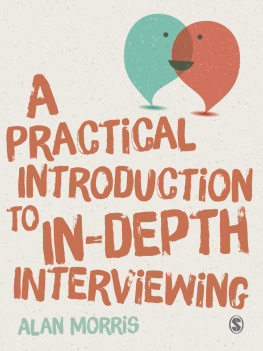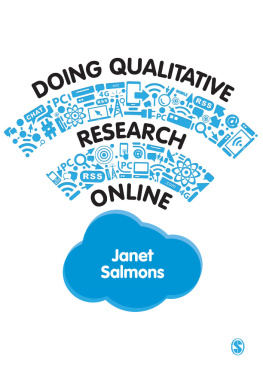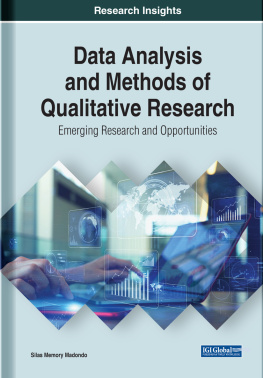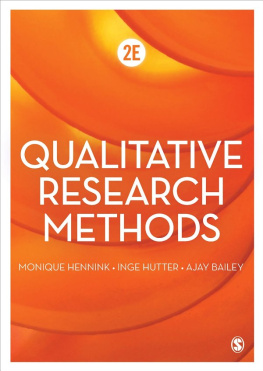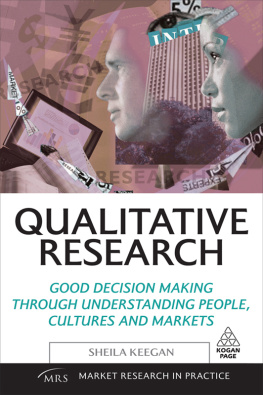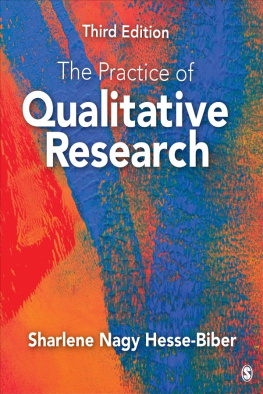A Practical Introduction to In-Depth Interviewing
A Practical Introduction to In-Depth Interviewing
SAGE Publications Ltd
1 Olivers Yard
55 City Road
London EC1Y 1SP
SAGE Publications Inc.
2455 Teller Road
Thousand Oaks, California 91320
SAGE Publications India Pvt Ltd
B 1/I 1 Mohan Cooperative Industrial Area
Mathura Road
New Delhi 110 044
SAGE Publications Asia-Pacific Pte Ltd
3 Church Street
#10-04 Samsung Hub
Singapore 049483
Alan Morris 2015
First published 2015
Apart from any fair dealing for the purposes of research or private study, or criticism or review, as permitted under the Copyright, Designs and Patents Act, 1988, this publication may be reproduced, stored or transmitted in any form, or by any means, only with the prior permission in writing of the publishers, or in the case of reprographic reproduction, in accordance with the terms of licences issued by the Copyright Licensing Agency. Enquiries concerning reproduction outside those terms should be sent to the publishers.
Library of Congress Control Number: 2014953937
British Library Cataloguing in Publication data
A catalogue record for this book is available from the British Library
ISBN 978-1-4462-8729-3
ISBN 978-1-4462-8763-7 (pbk)
Editor: Katie Metzler
Assistant editor: Lily Mehrbod
Production editor: Victoria Nicholas
Copyeditor: Jen Hinchliffe
Proofreader: Kate Campbell
Marketing manager: Sally Ransom
Cover design: Shaun Mercier
Typeset by: C&M Digitals (P) Ltd, Chennai, India
Printed in Great Britain by Henry Ling Limited at The Dorset Press, Dorchester, DT1 1HD
For Sue, Sophia and Jeremy
About the Author
Alan Morrisis an urban sociologist based in the Australian Centre of Excellence for Local Government, at the University of Technology, Sydney. He has a PhD in Sociology from the University of the Witwatersrand in South Africa. His PhD was a major qualitative study of inner-city transition in Johannesburg during the final years of apartheid. The book, based on his PhD,
Bleakness and Light: Inner-City Transition in Hillbrow, Johannesburg (1999, reprinted 2001), is viewed as one of the key South African texts in urban studies. In Australia his main research focus has been on the impact of housing tenure on older people who are dependent on the age pension for their income. His research interests include housing, ageing, urban marginality and social policy. He has published extensively in peer-reviewed journals in Australia, the United Kingdom, the United States and South Africa.
Acknowledgements
A few people have helped this book along. Sasindu Gamage and Benjamin Hanckel read all the chapters and provided very useful feedback. Benjamin also generously shared a couple of his own personal interviewing experiences, which I have included in the book. The Director of the Australian Centre of Excellence for Local Government at the University of Technology, Sydney (UTS), Roberta Ryan, gave me the time and space to write the book. This is much appreciated. Jillian Rose applied her superb formatting skills to great effect. I received excellent advice on ethics from Racheal Laugery who is based in the Research & Innovation office at UTS. My editor, Katie Metzler, was always constructive and encouraging and was a pleasure to work with. The various reviewers certainly helped improve the final product and their critical comments are appreciated. Finally, I want to thank all the people I have interviewed over the years. It is a privilege entering into peoples lives, albeit for a short period of time. I have learnt a great deal and on many occasions have been inspired and moved by their graciousness, insights and resilience.
Preface
The book is geared towards aspiring social science researchers who have never done a study based on in-depth interviews or who have done some interviewing but have found the method and analysis daunting. It goes through every facet of conducting a study based on interviews and draws on actual studies to illustrate the challenges and possibilities. My hope is that by the end of the book you should feel confident enough to go out into the field to experience and enjoy this potentially extremely powerful and rewarding method. Reading the book will facilitate your progress but it is only by venturing out and interviewing that you will hone your skills.
In the first chapter I give a brief history of the interview and discuss its strengths and weaknesses as a method. I also discuss the different kinds of interviews. However, the focus in this book is on the in-depth semi-structured interview.
The second chapter discusses ethics. All institutions require that you obtain ethics approval prior to conducting your interviews. The chapter outlines the essentials of conducting ethical research and discusses the ethics application process. The ethics in the writing up of interviews is also examined. examines the selection, finding and accessing of interviewees.
is a practical but important chapter. It talks about the basic requirements for a successful interview. The importance of good equipment, dressing appropriately and finding a suitable venue tend to be underestimated. Many interview studies fail due to the interviews conducted not yielding much data. Although it is inevitable that interviews will vary in quality and some will be disappointing, there are ways to maximise the possibility that the interview will be successful.
suggests ways that you can salvage interviews that are going poorly. It also discusses the challenge of interviewing across difference. Every interview is a co-construction between the interviewer and the interviewee. The sex, race, ethnicity, sexual orientation and class of the interviewer/interviewee can make a difference to the trajectory of the interview. Difference is not necessarily negative. However, what is essential is that there is reflexivity on the issue. The final chapter examines the post-interviewing phase transcribing and writing up the interviews. The focus is on thematic analysis. A challenge is writing up the interviews in an interesting, rigorous and appealing way. This is a daunting and time-consuming task. However, there are methods you can adopt to facilitate the task and these are discussed.
The what and why of in-depth interviewing
In-depth interviewing is the most common qualitative research method. This is not surprising as when it is done well it is a powerful way to gather data. This chapter gives a brief history and definition of the in-depth interview and reviews its advantages and limitations. The question of when to use in-depth interviews is then discussed. The different kinds of in-depth interviews are summarised. The chapter concludes by reflecting on the current debate around the authority of the data obtained from interviews. Chapter headings include:

